On Friday June 30, in partnership with local MPs, leading academics, and industry experts from across the North East, Moderna hosted a discussion focussed on the potential for driving economic growth in the North East through investment in key health and life science sectors.
Leading the discussion Shadow Minister for Science, Research and Innovation and MP for Newcastle Chi Onwurah said that the Labour Party wants to see science drive regional economies. She noted a speech by the Leader of the Labour Party, Sir Keir Starmer – NHS fit for the future – which recognised that the NHS is a great platform for innovation but needs to adopt innovative therapies more quickly. She also noted the global reach of North East life sciences startups and said Labour wanted to support the industry to ensure further success stories from the region.
Newcastle upon Tyne Central MP Chi Onwurah said:
“It was fantastic to join Moderna, businesses, university representatives, and fellow parliamentarians for a roundtable on the success, potential, and future of the North East’s life science and research sectors. Attracting greater private investment into our region’s growing Life Science sector will help deliver sustainable, long-term growth and reduce health inequalities in our region.
“Labour are committed to investing in R&D to stoke the engine of high-skilled growth, catalyse regions that have been left out of science investment, and access new and diverse talent pools.”
Liz Twist MP highlighted the opportunities for investment in rare disease research in the North East to build upon the extensive work that is already being done in the region.
As Chair of the parliamentary group on Rare Diseases, she has been engaging with patient groups up and down the country on this issue. The Blaydon MP also raised the matter of pricing mechanisms for innovative treatments and explored how industry can support the NHS’ aims to tackle rare diseases together.
Stuart Carroll, Moderna’s Director of Market Access and Policy Affairs for the UK and Ireland, who chaired the roundtable, shared details of Moderna’s investment in the UK and commitment to supporting the Government’s ambition to make the UK a science superpower.
He also outlined possible scenarios for partnership between Moderna and North East institutions.
Carroll outlined Moderna’s new 10-year strategic partnership with the UK Government to deliver the Moderna Innovation and Technology Centre (MITC). The new centre ensures that NHS patients across the North East will have access to a domestic supply of COVID-19 vaccines, as well as potential vaccines developed for other respiratory infections, developed using Moderna’s research and technology.
Dr Philip Cruz, Country Medical Director at Moderna UK, highlighted Moderna’s long standing partnerships with academic institutions and the role universities in the North East could play to support Moderna’s work developing innovative new therapies. He explained that Moderna is also passionate about supporting a preventative model of health and social care, and is eager to work closely with politicians, experts, and officials across the North East and the UK to minimise barriers to this vital research and development, and unlock patient benefits.
Professor David Burn, Pro-Vice Chancellor (Medical Sciences) at Newcastle University, raised many of the exciting life sciences projects occurring in the North East, such as the Health Innovation Neighbourhood, as well as highlighting the University’s partnership work, including the strengths of the Academic Health Science Centre (Newcastle Health Innovation Partners). He also noted the joint work that Newcastle University is doing with Northumbria University and highlighted opportunities for Moderna to collaborate with local researchers in Newcastle, particularly in the area of rare diseases, cancer and fibrosis.
Professor Dianne Ford, Pro-Vice Chancellor, Faculty of Health and Life Sciences at Northumbria University raised the exciting work happening in the North East on patient data and digital transformation, noting how this could support Moderna’s vision of an enhanced UK clinical trials system. She also raised Northumbria University’s ambitious plans for the Centre for Health and Social Equity (CHASE), as well as the existing work researchers there have done on virology, which would support the development of new mRNA vaccines, that could help with the UK’s future pandemic resilience.”
Professor Dianne Ford said:
“The discussion uncovered some areas of real synergy between Moderna’s priorities and the areas of distinctive research strength embedded in the city’s two universities, which offers some exciting potential for investment and mutual support.”
Michelle Duggan, Inward Investment Manager from Invest North East England spoke about inward investment opportunities in the North East, as well the increased powers and funding that the new North East Mayoral Combined Authority Devolution Deal will bring, and how this could support the growth of the life sciences and health innovation sectors. She also detailed some of the work happening locally to promote science careers in schools and colleges, and provided an outline of other existing centres of excellence in the North East such as Sunderland University’s Medical School.
To find out more about the regions Life Science Sector, visit INEE’s dedicated pages
Posted in: Life Sciences
